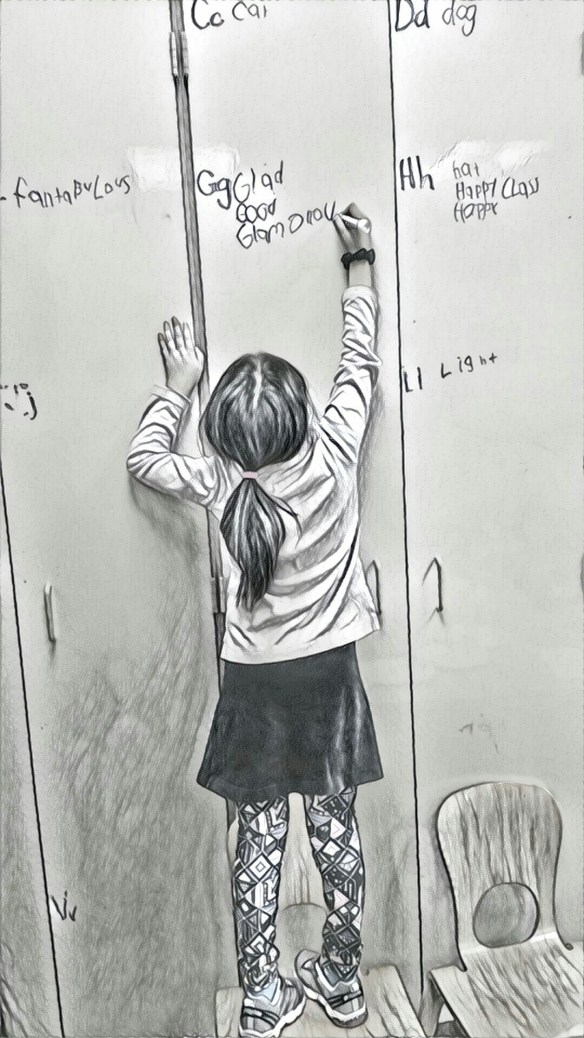As educators we often talk about wanting our students to:
- reach
- stretch
- go as far as they can
- achieve
We also work hard to provide:
- instructions
- help
- scaffolding
- tools
- structure
My classroom word wall is quite fluid. Sometimes it has our names on it, other times it has words we may encounter in our various learning units. Once we return from winter break, and move towards spring break, I begin to give the world wall more and more to my students.
In reading they each write three words they want to add to our word wall. They must be words they know how to spell like they are written in a library book.
I’m careful to not say “Three words you know how to spell correctly.” When they use inventive spelling — which is appropriate and important in Kindergarten — the words they write are correct if they, and I, can read them. For instance eat might be written ete. Or, teacher might be encoded as teechr. These are examples of correct inventive spelling, because they follow phonetic rules, and accurately convey the sounds, words, and thoughts of the writer. I don’t want them to begin thinking that the way they write is incorrect, and only by memorizing words, or asking for help, are they able to spell, write, and share their ideas.
In Social Studies, my students think of three words related to our topic, that they’d like to add to our word wall. Often these are words that are difficult to spell like they are spelled in library books. My girls stretch them out as best they can, then we work together to make any needed changes. This gives me the opportunity to share rules, digraphs, blends, and crazy things about the English language (for instance, ir, ur, and er have the same sound!), as well as help my girls find their own errors in thinking, hearing and sounding out.
For instance, one girl wanted to write strong. She srog. We stretched the word out, tapping the sounds – to try and tease out that n sound. She added it. Then I asked her to read me her word again. She read strong. “Hmmm,” I said, “I read srong.” She looked at me with a puzzled look, and sounded it out while holding my gaze. Then she looked at what she wrote and sounded it out again. Finally, she laughed and said “Oh, t! I forgot a t.”
These moments are examples of my students reaching, stretching, and attaining, while I support and scaffold. Sometimes, though, the reaching, stretching, and scaffolding is much more literal.
My students are confident in their own ability to find safe and effective ways to use things in our classroom to achieve their goals. So, they often create their own scaffold, and reach as high as they desire.

But, there are times the height they hope to attain is beyond their reach. That’s when I offer myself as a resource. I provide the scaffold they need to reach higher than they might on their own.

I really like that I am supporting them, rather than holding them. They get the chair. They have to be brave enough to step onto the scaffolding (me) and stand tall. Even though I am spotting them all the while it’s not always easy! Once on the scaffold, they have to breathe, trust, focus, reach higher. and write — undeterred by the distance they are from the floor!
For me, these are all moments of creativity.
- Thinking outside the box.
- Being open to possibility.
- Inventing as we spell.
- Not being deterred by what seems impossible considering the tools we have or do not have.
- Risking.
- Being brave.
- Giving it a go.
- Reflecting, adapting and rethinking.
And, let us not forget the equally important and essential parts of engaging in creative thinking and doing:
- Experiencing joy.
- Being struck by beauty and awesomeness.
- Learning.


AWESOME! A great way to connect stretching our bodies and stretching our minds! I loved how you literally became a scaffold, helping a student to write on the word wall! Sometimes teachers are so caught up in the particular skills of reading and writing that they forget the most important ingredients: imagination and fun! To become an intrepid writer – one must fearlessly take letters, put them together, and make meaning. That is hard work, but with an engaged teacher, writing becomes a positive and rewarding experience. Thanks!
LikeLike
Thanks … and you’re welcome! I love your sentence – “To become an intrepid writer – one must fearlessly take letters, put them together, and make meaning.”
For me that is a reason to have fun … because sometimes it really is a fierce, frightening, remarkable task, and laughing and fun actually helps us be intrepid, and open our mind to more ideas!
LikeLike